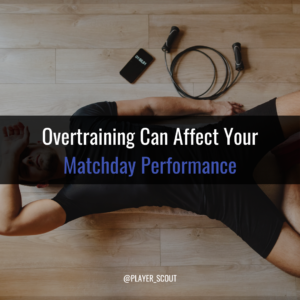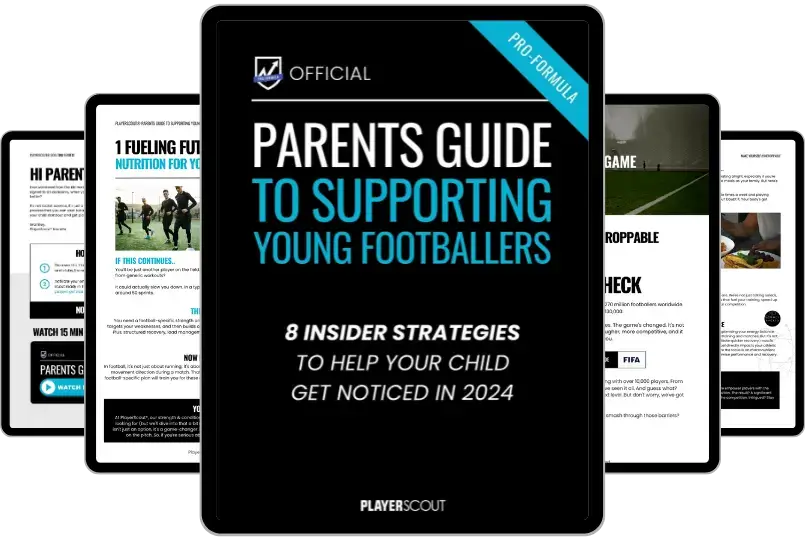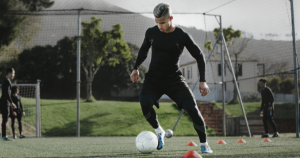
Form Is Temporary, Class Is Permanent
From my 9 years as an amateur/academy player and the past 10 years working to help players improve, I can tell you that there will be moments when you are full of confidence, when everything you try on the pitch seems to come off and you’re firing on all cylinders.
And then there are other moments when you just can’t seem to get a break, you feel off the pace, your form is lacking and if feels like you are going backwards.
It happens to us all.
Even the best players in the world go through bad patches where they can’t seem to do anything right (Alexis Sanchez is a prime example of this).
Is this something you’re currently suffering from?
Don’t fret, this has happened to a lot of players I work with in the PS Training Academy and once we discuss further it usually comes down to one (or more) of the key areas I’m going to go over below.
Let’s get to it.

What You Eat Has a Huge Effect on Your Football Performance!
To perform well and progress as a footballer, you need to progressively stress your body in training and allow for adequate recovery. However, if you do not feed your body adequate nutrition, it is unable to recover properly.
And this can lead to:
Poor performance in training and matches
To complete and train your body needs energy. This energy is provided by the 3 macronutrients carbohydrates, fats and protein. But if you don’t provide your body with enough of these in your diet, your body is unable to perform at peak levels, leading to subpar performances on the pitch.
Longer Recovery Time
Not only will your on-field performance and training be affected, but the amount of time it takes to recover increases.
You see…
Training causes micro tears in your muscle. As you recover your body rebuilds these micro tears, leading to growth in muscle mass, endurance and strength.
Studies show that the first 2 hours after training and matches are the most important for recovery and if you don’t supply your body with adequate nutrition in this period you may prolong the recovery process for days or even weeks.
If you have 1-2 games a week, this can drastically affect your ability to train in between matches and give your all on a game day.
Immune Suppression
Another effect of training is the stress if puts on your body. A sufficient amount of training stress triggers your body to increase growth, improve fitness and release energy – such as stores in body fat.
The problems occur if these levels in stress hormone release continue over a prolonged period, as this will impair the functionality of your immune system.
One key area for players is the affect that low blood sugar from depleted carbohydrate stores in the body has on immune function and stress hormone levels.
So, the key is to eat a well-balanced diet, specific to your own daily needs and the demands of your lifestyle and training activity level.
Body Size and Weight Changes
A lot of players in the PS Training Academy often ask for a nutrition plan that can help them either put on size or reduce unwanted body fat.
This is not uncommon with most players, the problems arise when you put on unwanted weight, due to poor eating habits and food choices. If your nutrition is not specific to your training activity you may end up losing muscle mass, and putting on body fat, leading to a less athletic stature and physique.
When this happens, players usually become slower on the pitch, tire more easily and are unable to perform to the standards previously set.

Lack of Quality Sleep Can Lead To Poor Performance
Another key area that is often overlook by players is the quality of your sleep. We see a lot of players who eat, sleep and breathe playing football, it’s the first thing they think about when the wake up and the last thing before bed.
But…
There main focus is usually physical conditioning and nutrition, leaving sleep as something that just happens at the end of the day. But did you know that sleep actually plays a vital role in football performance?
Studies have shown that quality sleep can actually be a key factor between winning and losing in individual sports. REM (Rapid Eye Movement) sleep provides energy to both your body and your brain, and a lack of sleep doesn’t allow your body to release vital hormones needed for repair.
Research in the SLEEP journal highlights the key role sleep has on performance. One of the key findings was that poor sleep led to a decline in split second decision making, whereas well rested participants showed increases in accuracy.
Lack of sleep also increases the stress hormone known as cortisol and has been seen to decrease the amount of carbohydrates stored for energy and the production of glycogen, which are both key for performance.
Therefore, sleep increases your chances of fatigue, poor focus and low energy during a match. It may also reduce your ability to recover post-match.
So, no matter what level you currently play, allowing yourself to get the necessary amount of sleep is vital if you want to perform at your best.

Overtraining Can Affect Your Matchday Performance
When it comes to training slogans one of the most used is:
NO PAIN, NO GAIN
And while this does look great on a t-shirt, for footballers this idea can be very detrimental on your performance. This type of mentality can often lead to overtraining syndrome.
We all know that for players to improve they need to increase the intensity and volume of their training as their fitness improves. But problems may occur if this increase comes before the players body is prepared to handle it or if the player doesn’t plan for sufficient recovery. This increase in training intensity can backfire resulting in a decrease (not increase) in performance.
Overtraining occurs when you train above the capacity your body is able to recover. There are many signs and symptoms of overtraining including:
- Feelings of depression
- Insomnia
- Loss in bodyweight
- Lack of mental concentration
- General fatigue and feeling lethargic
- Decrease in match performance
- Restless, anxious, irritable, excitable
- Change in appetite
- Loss of motivation
The key to avoiding overtraining is to ensure you maintain the correct balance between sufficient volume and intensity to improve your performance, without leading to overtraining syndrome. This is best achieved by following a personalised program and monitoring your energy before and after training.
One strategy to reduce the chances of overtraining is to keep a daily record of your:
- Sleep quality
- Feelings of fatigue
- Stress levels
- Muscle soreness
And rate each area with a 1-7 each day. (1 being good, 7 being bad).
Over the course of the season each will average below 4, if you are not suffering from overtraining. However, if either of these areas rise to 5 or above for a number of days, you should aim to cut back your training intensity until your ratings are back to the 3’s again.
Returning to ratings around the 3’s is a good indicator that you have recovered enough from the high training period and are now ready to put in some high intensity training again.
So, if you have high feelings of fatigue or have a decrease in the quality of your sleep during the mid-season, this could signal that you need to take your foot off the pedal and give yourself some time to rest.

Stress Levels May be Causing Poor Performance
- Worry
- Apprehension
- Nervousness
- Doubt
There are 2 types of anxiety that can affect a player’s performance:
Trait Anxiety – This is part of the players personality and is a constant feeling regardless of the players current situation. Players with trait anxiety will constantly feel worried and are more likely to see situations as scary and threatening, leading to a more extreme response than players who do not have trait anxiety.
An example of this is when two different players take a penalty kick under the same circumstances, one may find the situation scary, whilst the other may be calmer.
State Anxiety – Then we have state anxiety which changes based on a player’s situation. This type of anxiety can change throughout a game, and a player can experience higher levels in certain situations. For example, a winger may feel a higher state anxiety when defending a corner than when dribbling past a defender
Therefore, trait anxiety makes players perceive situations to be more threatening then perhaps they should feel, causing them to respond with higher state anxiety levels.
So, What Are The Main Stressors Players Can Experience?
Simply put a stressor is a factor that can increase stress levels in a player. All players experience stressors and many of these factors can lead to anxiety on the football pitch.
There are three main sporting stressors that can affect a player’s performance:
1 Competitive Stressors – These are stressors that a player may relate to competition and match days. Such as, injury, how prepared the player feels, pressure to perform from coach and individual performance expectations.
2. Organisation Stressors – These are stressors that are related to the organisation in which you play, such as your team/teammates, your manager, your clubs facilities, fans and officials.
3. Personal Stressors – These are the stressors that relate to anything outside of football. Such as work or school life, family and relationship problems.
If the player feels that any of these stressors are not under control, this may result in a bad performance on the pitch. An example of this is if a player does not feel prepared enough for the match, he may end up overthinking, resulting in poor performance as the body is unable to flow.
How Should Players Manage Stress?
-
- Talking with your coach about anything you are unhappy with, such as equipment or pitch quality.
- Setting long term goals on areas you would like to improve and discussing these with your coach.
- Talking to your coach about the structure of training, that may be affect your preparedness.

Lack Of Confidence Can Lead To Performance Slumps
One of the most important mental factors in football performance is confidence. This is basically how much you believe in your own ability to perform well and achieve your goals.
As a player you may have tons of ability, but if you don’t believe in that ability, you will not be able to show it on the field. And this becomes even more important the higher you progress up the footballing ladder.
On a matchday, you can be your greatest ally or your own worst enemy. You already have 11 players against you, if you are not confident, then you have no chance of being triumphant.
But why do players lose confidence?
Confidence can be affected by anything that counters your belief in your own abilities. One of the biggest causes in lack of confidence is failure, for example missing an early penalty kick or an open goal. This can lead to you losing faith in your own ability and then become more cautious.
Coming off the back off a poor run of results/performance can also feel like failure and will affect your perception of your ability.
Failure is probably the single biggest cause of lack in confidence, as it is evidence that your confidence is unwarranted.
You need to understand that Confidence is a skill
Many players believe that you either have confidence or you don’t. But, let me tell you now. This is completely untrue. Confidence is a skill, that can be trained through focus, effort and repetition.
The issue you is that some players practice good confidence and some practice bad confidence skills. Players who are negative a lot are reinforcing negative confidence skills, which will come out in game situations, leading to poor performance.
Therefore, you want to retrain the way you think, by practicing good confidence skills on a regular basis. This will help to break the negative confidence habits and install new positive skills and confidence.
So how do you improve your confidence on the pitch?
- Be well prepared in the build-up to the match
- Accept that failure may occur
- Stay positive and motivated as you face challenges throughout the match
- Understand that experiencing these challenges is important to help you become a better player
- Seek out challenging or demanding situations
- Work and focus on the areas that are needed to overcome challenges
- Never give up!
What Next…
We’ve now gone over some reasons why your performance may be slumping or why you just can’t seem to regain the form you were displaying in previous seasons.
Now it’s time to start reversing some or all of these performance destroyers, to help you dominate on the field.
And remember if you need help taking your on field performance to the next level, so you can become a fitter, stronger faster and more confident players, then join me in the PS Training Academy.
The 30 Day Challenge is our most popular player transformation program. Where I will guide you through your training and nutrition from day 1-30















